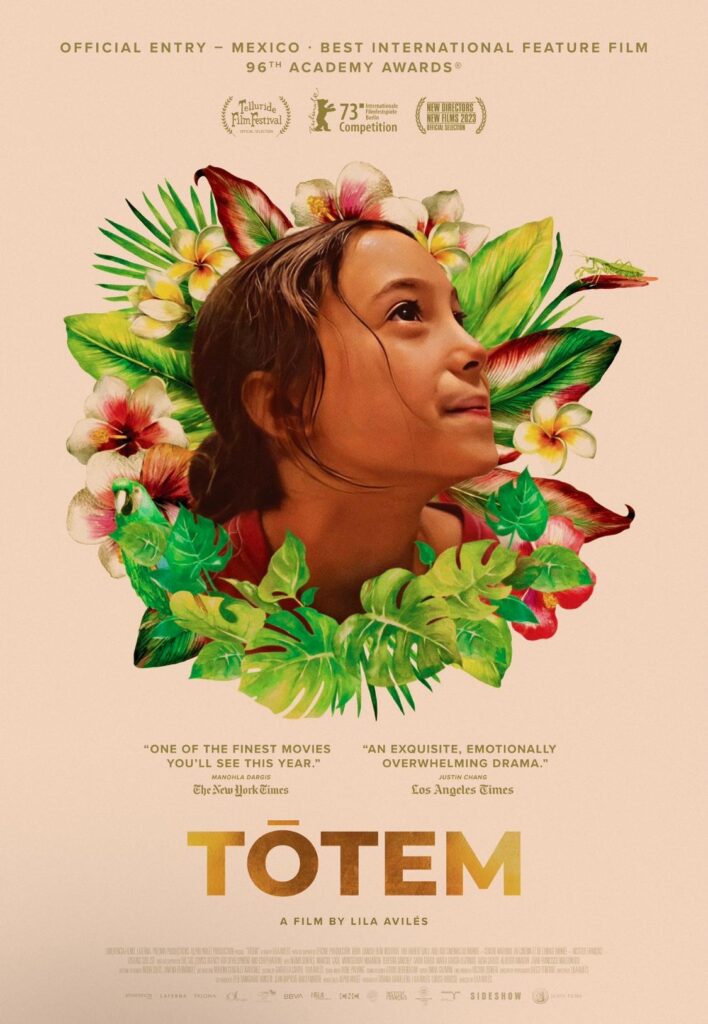Totem
Introduction
How would you explain the concept of life and death to a child? In my lifetime, I have encountered many deaths of closed ones along the way but I was all of 6 years old when I experienced it for the first time. I vividly remember being confused while only depending on others to reciprocate what feelings were appropriate even as it was hard to comprehend things going on around me. But as time went by and I did come to terms with it, it made me a little more prepared for the subsequent encounters. With that, I finished watching the new Spanish language film Totem which is Mexico’s Official Submission to the Academy Awards this year(not in the final 5). And with the Oscar season warming up, I have been consciously looking to close the gap in terms of the releases that I haven’t yet watched. Totem has been on my watchlist because I happened to read a little bit of its premise of the concept of life and death told through the lens of a child. And given that we all may have been in such a situation previously in our lives, there was a bittersweet feeling as I ventured into the drama. So then, does Tótem manage to impress, let’s find out.
Story & Screenplay
Totem follows the story of a seven year old girl who is witness to the preparation involving her father’s birthday. But slowly as the evening progresses, she gets to know that this might be her father’s last birthday given that he has been suffering from a prolonged illness. The story here is deliberately disoriented and scattered while only briefly being heartfelt and never heartbreaking, something that immediately reflects the mindset of the little seven year old and her first brush with the concept of death. The screenplay standing at just under a 90 minutes might seem understated but if you are willing to attentively subject yourself in the drama then you would realise the kind of depth that the writing incorporates in its duration. This section will contain spoilers.
The drama begins in a restroom with the introduction of a seven year old girl, Sol who is sharing a private giggly moment with her mother who tells her to practice a song for her father’s birthday. The mood of the drama is light-hearted wherein you are acquainted with the fact that there is a party later in the evening owing to Sol’s father’s birthday, something that has kept her lively throughout the day. But this mood suddenly changes in the very next scene when Sol tells her mother to stop at a bridge as she wanted to make a wish about her father being alive for a long time, this as the face of Sol’s mother falls. These two scenes are perfectly representative of two aspects in the lifetime of humans – life and death, while also alerting the viewers on the drama to follow.
The proceedings are interesting and very subtle and niche with its themes from that point wherein you need to be quite attentive with the conversations traspiring. So Sol is dropped at her aunts’ place who are organizing a party for Sol’s father, Tona who is not quite shown in the first half of the film. It is only when Sol questions whether her father loves her and cares for her is when her aunt replies that he needs rest to be ready for the party. It is through these mundane conversations that you get an account of Tona’s illness who is suffering from cancer, much like his mother who passed away due to the same reason(she was previously confined to the bedroom where Tona finds himself in), and his father who is a cancer survivor but lost his ability to speak.
Throughout the course of the drama, you see contrasting behaviors towards the situation of potential death that is prevalent in the household. Sol is oblivious of the fact while briefly absorbing the atmospherics around her, even as she occasionally wishes to know random things on her phone like ‘When will the world end’ or ‘what happens after death’. This is in contrast to other folks of the household who have encountered deaths previously and are more accepting and used to it with each one having their own ways to deal with it. In fact, at one point, one of the aunts is shown to call a person to remove all evil spirits from the household and thereby have positive vibes in the room thus inducing a tinge of black humour along the way.
The party that takes place in the evening was unofficially a farewell party for Tona who barely has the strength to standup while also soiling his pants signalling his downward spiral. But he does have a moment to witness his ‘funeral’ whilst he is alive, much unlike most of us would ever have the privilege of. And slowly through the night, Sol is acquainted with the one truth of life which in death, in one of my favourite climax scenes of recent times. Tona is asked to blow the candles on his cake while being told to make a wish, something that he refuses in jest. This sequence makes Sol realise that even a wish(used as a foreshadow from the second scene of the film) won’t be able to save her father. The screenplay enters a heartfelt space although it isn’t entire heartbreaking given that the eventual fate of Tona is kept under wraps and never really shown. But overall, the screenplay catches you off guard as it makes you ponder on the mysteries surrounding us related to life and death.
Dialogues, Music & Direction
The dialogues are conversational and filled with a lot of details and references which means that you need to stay attentive throughout the drama. The BGM is sparingly used, never trying to manipulate the feelings of the viewers while allowing them time to comprehend their own feelings. The cinematography captures some tight and intimate shots that allow you in get a glimpse of the psyche of various characters who are dealing with the situation in a different manner. The editing doesn’t break the continuity of the drama while deliberately being scattered and disoriented to allow space for you to look within. Director Lila Aviles does a wonderful job in constructing the drama through different perspectives while eventually zeroing in on Sol, who is about to encounter an event for the very first time in her lifetime. She focuses on the characterization that drive the narrative while making for a poignant watch. The direction is splendid here.
Performances
The performances are excellent by the ensemble cast. Teresa Sanchez as Cruz has her moments to shine. Iazua Larios as Lucia is first rate in an incredible job done. Saori Gurza as little Esther is wonderful to watch and it made me ponder on the situation that she would find herself in, similar to Sol at some point in life. Mateo Garcia Elizondo as Tona is wonderfully restrained as a character slowly resigning to his fate. Marisol Gase as Alejandra is subtly brilliant, almost showcases how unaffected she is with the situation in the house, whereas in reality she would definitely be hiding her feelings. Montserrat Maranon as Nuri is more forthcoming with her feelings and vulnerabilities in a wonderfully portrayed character. But the life of the drama is Naima Senties as Sol who witnesses her life change slowly but surely throughout the evening. Her blank expressions are spot on, reflective of the confusion and conflicting thoughts engulfing around her, slowly as she comes to terms with her reality. It was a terrific performance by her in every sense of the word.
Conclusion
Mexico’s Official Submission to the Academy Awards this year(not in the final 5), Totem is a conflicting and bittersweet musing of life and death told through a child’s gaze that makes for a wonderfully poignant watch. The drama is highly recommended from my end.




